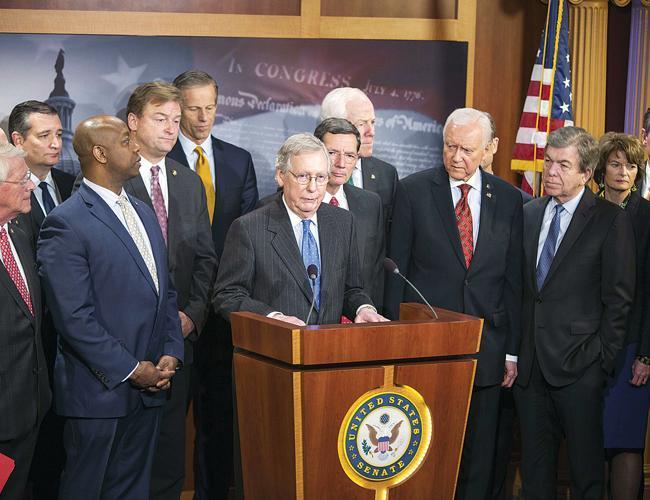
Senate Majority Leader Mitch McConnell speaks at the press conference after the Senate vote of the tax reform bill. The Senate has passed the tax reform bill and it will return to the House of Representatives for final approval. The rewrite of the tax code provides dramatic tax breaks to corporations.
he U.S. Senate narrowly approved a sweeping tax overhaul early on Dec. 19, putting President Donald Trump on the brink of his first major legislative triumph nearly a year after he took office.Hours earlier, Trump’s $1.5 trillion deficit-busting tax cuts cleared the House of Representatives, but a rare last-minute snag over parliamentary rules will force the lower chamber to vote on the updated package once again late on Dec. 19.
World stock markets wavered just below recent record highs while U.S. Treasury yields held near multi-month peaks of last week as the final procedural throes of long-awaited U.S. tax reform played out in Washington. European stock markets nudged lower, with blue-chip indexes in Germany, France and Britain flat to a touch weaker on the day.
In Asia, MSCI’s broadest index of Asia-Pacific shares outside Japan bobbed lower in a choppy session, while Japan’s Nikkei index finished up 0.1 percent. MSCI’s world equity index, which tracks shares in 47 countries, was little changed and holding just below record highs hit on Dec. 18.U.S. Treasury yields, which notched up their biggest one-day jump in almost three months on Dec. 19 as the tax bill moved towards passage, steadied at around 2.46 percent -- holding near the previous day’s highs.
The deepest rewrite of the tax code in three decades provides dramatic tax breaks to U.S. corporations, and families at all incomes levels will see their income tax drop starting next year, with the largest benefits going to the wealthy.The Republican legislation passed the Senate along strict party lines, 51 votes to 48, with all Democrats united in opposition.
The vote had appeared destined to a dramatic showdown, especially with Senator John McCain’s absence due to cancer treatment meaning Republicans could afford only one defector.Vice President Mike Pence presided over the chamber in the event he needs to break a tie. But with senators Marco Rubio and Bob Corker backing off their threats to oppose the bill, it ultimately carried through, and Pence pronounced to loud cheers, “the Tax Cuts and Jobs Act is passed.”
In the House, 12 Republicans had joined all Democrats in opposition as the bill passed 227 to 203.“Today we are giving the people of this country their money back,” said House Speaker Paul Ryan, who forcefully banged the gavel down as he proclaimed victory, as quoted by AFP on Dec. 20.Trump, who has pushed hard to get the measure across the finish line, tweeted his congratulations to Ryan and all other “great House Republicans who voted in favor of cutting your taxes!” The procedural snafu only became apparent afterward.
Senate Democrats said they demanded that three provisions in the bill -- including one allowing the use of savings accounts for home-schooling expenses -- be stripped out because they violate the Senate’s so-called Byrd Rule, guidelines on the kinds of legislation that can pass the Senate with just a simple majority.
Democrats seized on the hiccup as proof that Republicans were rushing to jam the tax cuts through Congress without enough study.“In the mad dash to provide tax breaks for their billionaire campaign contributors, our Republican colleagues forgot to comply with the rules of the Senate,” senators Bernie Sanders and Ron Wyden said in a statement, as reported by AFP. Republican leaders unveiled their final version of the bill only late last week, and Trump has demanded it reach his desk by Christmas.
$1.5 trillion addition to national debtThe Republican plan is projected to add nearly $1.5 trillion to the national debt over the coming decade, according to the Joint Committee on Taxation.
But that figure drops to about $1 trillion when economic growth is accounted for.Ryan stated that a median-income family of four earning $73,000 annually would save $2,059 in taxes next year.
The Democratic opposition has denounced the measure as mostly benefiting companies and the wealthiest Americans -- including Trump himself -- and warns it risks blowing a hole in the national debt, which has surged past $20 trillion.